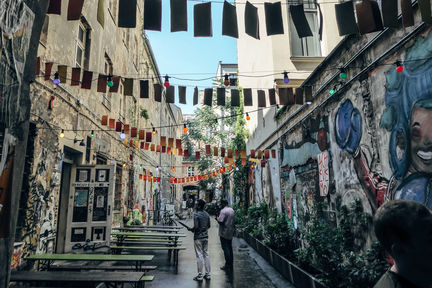On refugees, Germany, culture and Europe - Caitlin L. Chandler in NYRB
'De Maiziere’s argument was quickly rebutted by many across the political spectrum in Germany, including his boss, German Chancellor Angela Merkel, who then published her own A-Z list on what it means to be German. Eager to articulate a more inclusive vision, Merkel recognized Germany’s Judeo-Christian roots while acknowledging the importance of Muslim and other religious communities. (She also mentioned bratwurst and punctuality.)
Still, the notion that there is something exceptional about European culture—an old idea that gained new currency in the age of empires and colonialism—has reared up again across the continent as a response to postcolonial migration. In September 2019, the European Union changed the job description of its migration commissioner to that of “Protecting the European Way of Life.” After the EU Parliament protested, “protecting” was replaced with “promoting.”
Many of the 1.06 million Syrian and other refugees granted asylum by Germany over the previous five years have received substantial state assistance to help them learn German and integrate into the labor market, as Alaa is starting to do. Germany spent an estimated 23 billion euros of its 343 billion euro federal budget last year on integration support. (In spite of this outlay, there was still an 11.2 billion euro budget surplus.) According to the government’s calculations, 35 percent of refugees who arrived in 2015 had landed a job by October 2018—no small feat considering a laborious process that does not recognize most foreign qualifications and requires new arrivals first to spend as much as two years learning German and a further two years in vocational training before they can even apply for a position.
Germany has an aging population, and its ability to sustain economic growth and meet its state pension obligations depends on allowing immigrants to become part of the workforce. One study estimates that already, in the next three years, Germany will reap in taxes from immigrant workers more than it spends on integration.
Yet as much as Merkel has fought, sometimes within her own party, for the right of Syrian and other refugees to remain and build new lives in Germany, she also wants to appear tough on migration—by speeding up deportations of rejected asylum-seekers, as well as “economic migrants.” The government has not proposed programs to allow for legal economic migration (such as another guest worker program); and for those like Eric who made it to Germany from Libya, it will not grant temporary work permits or provide integration support. It is an open question how effective the more restrictive policy has been. A report in the German newspaper Die Welt am Sonntag this month found that nearly 5,000 asylum-seekers who were deported from Germany over the past seven years later re-entered and applied again for asylum.
Instead, Germany, in line with the European Union, has shifted the focus of its immigration policy to funneling foreign and security aid to Middle Eastern and African countries in an effort to forestall people from moving. Merkel’s CDU has been in a fragile governing alliance with the center-left Social Democrats since 2017, and in an attempt to respond to the AfD’s rise has proposed a number of measures, such as a new 1 billion euro Development Investment Fund for Africa. In total, Germany spent some 8 billion euros last year on initiatives to cut migration by trying to improve the standard of living in countries where migrants originate.
The fact that thousands of people continue to move from West, Central, and East Africa through Libya, where many experience violence and abuse in detention centers, and then risk their lives to cross the Mediterranean Sea, as well as by other border points, to reach Europe poses a challenge to Germany’s governing consensus. Those who reach the country do not fall into neat categories: while some have fled economic scarcity, others are refugees from differing degrees of violence and persecution, but almost all are traumatized in one way or another.'
Read the article here,
The belief that the own culture is exceptional and so much better than other cultures reveals above all fear and uncertainty.
We cannot deny that people feel the need to be secure, but we can stress that the need to feel secure doesn't mean that you have to live in a homogenous society. We must learn to feel secure among strangers, in other words, we must learn to become a stranger, a foreigner ourselves if not fulltime at least parttime.
